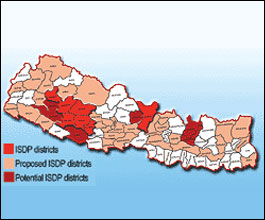 The government is looking beyond the peace talks at a massive hearts-and-minds programme to accelerate development in Maoist-affected districts, but is running into serious donor reluctance to back it.
The government is looking beyond the peace talks at a massive hearts-and-minds programme to accelerate development in Maoist-affected districts, but is running into serious donor reluctance to back it. The Integrated Security and Development Programme (ISDP) is patterned after a post-Vietnam counter-insurgency strategy, but its price tag of $114 million for three years is way beyond the government's own capacity. Last week, the National Planning Commission (NPC) presented what appears to be a hurriedly-prepared 13-page proposal to a consortium of donors, most of whom were sceptical about the government's ability to implement it.
Among the donors, Japan, Germany, Canada, Finland and Denmark as well as the World Bank and the Asian Development Bank appear to have serious doubts about the ISDP, while the United Nations Development Programme was fence-sitting. However, the United States Agency for International Development (USAID), the British Department for International Development (DfID) and the Norwegian Development Agency NORAD were for it.
"Few of us disagreed with its goals and the intense service delivery the government wants to make," one donor source told us. "But the political and security aspects made many uncomfortable." Those that said no were reportedly polite, but the message seems to be that donor support is not going to be easy. Added our source: "It will be a waste of time for the NPC if it still thinks it could get broad-based support for the program."
The ISDP was launched earlier this year in seven districts and this year the government allocated Rs 600 million for it, but much of this was budgeted with the expectation that the donors would come through. The ISDP is being implemented in seven districts-Gorkha, Rukum, Rolpa, Kalikot, Jajarkot, Salyan and Pyuthan-and the government would like to extend it to six more as soon as possible: Dolakha, Ramechhap, Surkhet, Dailekh, Dang and Lamjung. Prithivi Raj Legal and his team at the NPC also told donors that the situation was getting so bad that it may ultimately have to extend the ISDP to another 30 of Nepal's 75 districts.
The idea for the donor fund-raising meeting for ISDP is said to have come up after a group of Western ambassadors met Prime Minister Sher Bahadur Deuba a month ago. The diplomats reportedly warned Deuba he would have to produce results to make a difference, to which the prime minister is said to have hinted that if there was money to back the new defence and development plan, he could do it.
Donors keen to back the ISDP had their reasons. DfID, for instance, felt an efficiently implemented ISDP could be critical in delivering basic services and infrastructure to districts where development has come to a standstill because of the insurgency. USAID, on the other hand, is said to prefer a more cautious "transitional" approach, first testing out the programme in reasonably safe areas. The Norwegians, for their part, appear convinced that conflict resolution has to go hand-in-hand with development.
Among the multilaterals, the World Bank and the Asian Development Bank, who have their own performance criteria and are generally against doles, had no fresh commitments. Other bilateral donors told the government it may be wiser to use the money already in the pipeline better, while some said the government could change priorities rather than seek new commitments.
NPC officials played down the importance of the meeting. Ligal told us: "It was not a pledging meeting but one to update donors on the ISDP, its rationale, how it works, which programs we were taking forward and the overall status." He added that last week's meeting was the first round, and that Nepal could go to donors formally if it needed assistance, through the finance ministry.
The government plans to spend Rs10 million in each Village Development Committee under the ISDP to achieve noble goals, such as 100 percent literacy and school enrolment. It also wants to speed up infrastructure building, and launch income-generation activities. The government says it will chip in half the Rs10 million and wants donors to help with the rest, including purchase of communications and rescue equipment-not guns-for security agencies.
Patterned after the US government's Integrated Defence and Development (IDAD), the ultimate goal is to win the people away from the insurgents, ensuring stability so that further development can take place. Security is to be provided by the police, the new paramilitary and the Royal Nepal Army under a co-ordinated chain of command.
The prime minister heads the ISDP implementation team, which includes a number of ministers and the Chief of Army Staff. The program has four sub-committees: political, publicity, programs and security.


